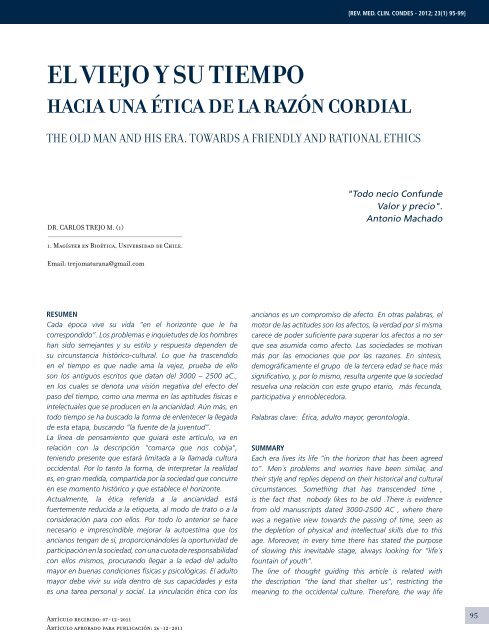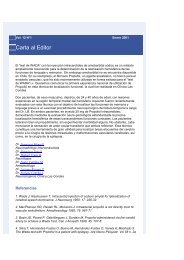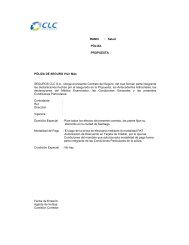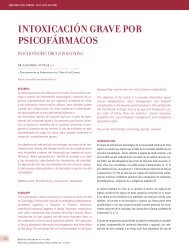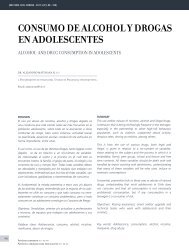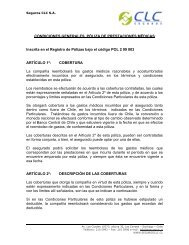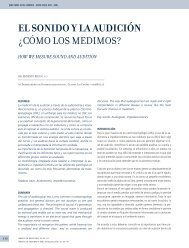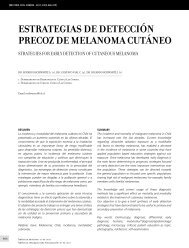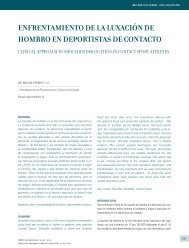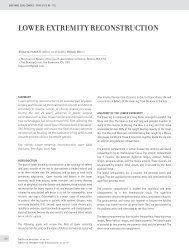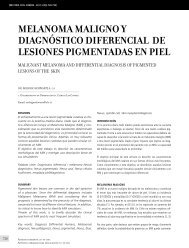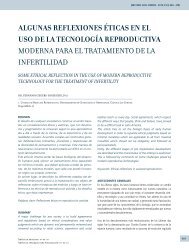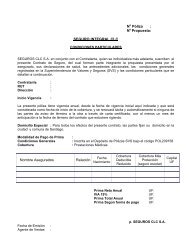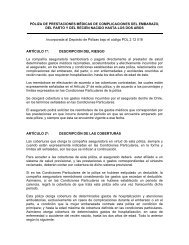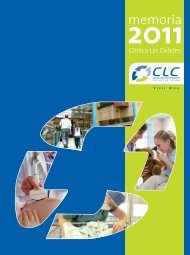Hijos adultos mayores al cuidado de sus padres, un fenómeno ...
Hijos adultos mayores al cuidado de sus padres, un fenómeno ...
Hijos adultos mayores al cuidado de sus padres, un fenómeno ...
Create successful ePaper yourself
Turn your PDF publications into a flip-book with our unique Google optimized e-Paper software.
[REV. MED. CLIN. CONDES - 2012; 23(1) 95-99]<br />
EL VIEJO Y SU TIEMPO<br />
Hacia <strong>un</strong>a ética <strong>de</strong> la razón cordi<strong>al</strong><br />
The old man and his era. Towards a friendly and ration<strong>al</strong> ethics<br />
Dr. Carlos Trejo M. (1)<br />
"Todo necio Conf<strong>un</strong><strong>de</strong><br />
V<strong>al</strong>or y precio".<br />
Antonio Machado<br />
1. Magíster en Bioética, Universidad <strong>de</strong> Chile.<br />
Email: trejomaturana@gmail.com<br />
RESUMEN<br />
Cada época vive su vida “en el horizonte que le ha<br />
correspondido”. Los problemas e inquietu<strong>de</strong>s <strong>de</strong> los hombres<br />
han sido semejantes y su estilo y respuesta <strong>de</strong>pen<strong>de</strong>n <strong>de</strong><br />
su circ<strong>un</strong>stancia histórico-cultur<strong>al</strong>. Lo que ha trascendido<br />
en el tiempo es que nadie ama la vejez, prueba <strong>de</strong> ello<br />
son los antiguos escritos que datan <strong>de</strong>l 3000 – 2500 aC.,<br />
en los cu<strong>al</strong>es se <strong>de</strong>nota <strong>un</strong>a visión negativa <strong>de</strong>l efecto <strong>de</strong>l<br />
paso <strong>de</strong>l tiempo, como <strong>un</strong>a merma en las aptitu<strong>de</strong>s físicas e<br />
intelectu<strong>al</strong>es que se producen en la ancianidad. Aún más, en<br />
todo tiempo se ha buscado la forma <strong>de</strong> enlentecer la llegada<br />
<strong>de</strong> esta etapa, buscando “la fuente <strong>de</strong> la juventud”.<br />
La línea <strong>de</strong> pensamiento que guiará este artículo, va en<br />
relación con la <strong>de</strong>scripción "comarca que nos cobija",<br />
teniendo presente que estará limitada a la llamada cultura<br />
occi<strong>de</strong>nt<strong>al</strong>. Por lo tanto la forma, <strong>de</strong> interpretar la re<strong>al</strong>idad<br />
es, en gran medida, compartida por la sociedad que concurre<br />
en ese momento histórico y que establece el horizonte.<br />
Actu<strong>al</strong>mente, la ética referida a la ancianidad está<br />
fuertemente reducida a la etiqueta, <strong>al</strong> modo <strong>de</strong> trato o a la<br />
consi<strong>de</strong>ración para con ellos. Por todo lo anterior se hace<br />
necesario e imprescindible mejorar la autoestima que los<br />
ancianos tengan <strong>de</strong> sí, proporcionándoles la oport<strong>un</strong>idad <strong>de</strong><br />
participación en la sociedad, con <strong>un</strong>a cuota <strong>de</strong> responsabilidad<br />
con ellos mismos, procurando llegar a la edad <strong>de</strong>l adulto<br />
mayor en buenas condiciones físicas y psicológicas. El adulto<br />
mayor <strong>de</strong>be vivir su vida <strong>de</strong>ntro <strong>de</strong> <strong>sus</strong> capacida<strong>de</strong>s y esta<br />
es <strong>un</strong>a tarea person<strong>al</strong> y soci<strong>al</strong>. La vinculación ética con los<br />
ancianos es <strong>un</strong> compromiso <strong>de</strong> afecto. En otras p<strong>al</strong>abras, el<br />
motor <strong>de</strong> las actitu<strong>de</strong>s son los afectos, la verdad por sí misma<br />
carece <strong>de</strong> po<strong>de</strong>r suficiente para superar los afectos a no ser<br />
que sea asumida como afecto. Las socieda<strong>de</strong>s se motivan<br />
más por las emociones que por las razones. En síntesis,<br />
<strong>de</strong>mográficamente el grupo <strong>de</strong> la tercera edad se hace más<br />
significativo, y, por lo mismo, resulta urgente que la sociedad<br />
resuelva <strong>un</strong>a relación con este grupo etario, más fec<strong>un</strong>da,<br />
participativa y ennoblecedora.<br />
P<strong>al</strong>abras clave: Ética, adulto mayor, gerontología.<br />
Summary<br />
Each era lives its life “in the horizon that has been agreed<br />
to”. Men´s problems and worries have been similar, and<br />
their style and replies <strong>de</strong>pend on their historic<strong>al</strong> and cultur<strong>al</strong><br />
circumstances. Something that has transcen<strong>de</strong>d time ,<br />
is the fact that nobody likes to be old .There is evi<strong>de</strong>nce<br />
from old manuscripts dated 3000-2500 AC , where there<br />
was a negative view towards the passing of time, seen as<br />
the <strong>de</strong>pletion of physic<strong>al</strong> and intellectu<strong>al</strong> skills due to this<br />
age. Moreover, in every time there has stated the purpose<br />
of slowing this inevitable stage, <strong>al</strong>ways looking for “life´s<br />
fo<strong>un</strong>tain of youth”.<br />
The line of thought guiding this article is related with<br />
the <strong>de</strong>scription “the land that shelter us”, restricting the<br />
meaning to the occi<strong>de</strong>nt<strong>al</strong> culture. Therefore, the way life<br />
Artículo recibido: 07-12-2011<br />
Artículo aprobado para publicación: 26-12-2011<br />
95


